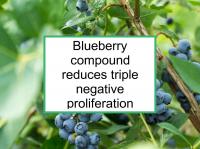Blueberries have been shown to inhibit both hormone receptor positive (ER+/PR+) and hormone receptor negative (ER-/PR-) breast cancer growth in cell studies and animal models of breast cancer. Now a new study has confirmed that blueberry compound pterostilbene has powerful anticancer effects.
Blueberries inhibit TN breast cancer growth and metastasis
Triple negative is a subtype of breast cancer that is estrogen receptor negative (ER-), progesterone receptor negative (PR-), and human epidermal growth factor receptor 2 negative (HER2+). Blueberry extract has been shown to exhibit antitumor activity against MDA-MB-231 triple negative breast cancer cells and reduce their metastatic potential. Blueberry was found to inhibit cell proliferation in triple negative cells with no effect on normal breast cells in one study. Blueberry also reduced the metastatic potential of triple negative cells through inhibition of cell motility.
In animal studies, dietary blueberry has been shown to reduce triple negative tumor volume in female mice. Blueberry diets reduced triple negative proliferation (as measured by Ki-67) and increased cell death. In addition, a blueberry diet inhibited triple negative tumor metastasis in another mouse study. Analysis of tumor tissues has demonstrated that blueberry-fed mice tumors have significantly altered expression of genes important to inflammation, cancer, and metastasis.
Latest research finds pterostilbene has anticancer effects against BC
The study referenced above was designed to investigate the antitumor activity of pterostilbene against various types of breast cancer, including hormone receptor positive (ER+/PR+), HER2-positive (HER2+) and triple negative (ER-/PR-/HER2-). Treatment of the three breast cancer cell types resulted in a dose-dependent reduction in proliferation, especially in triple negative MDA-MB-468 cells. Pterostilbene was found to cause cell cycle arrest at the G0/G1 phase in all three types, but the resulting apoptosis (programmed cell death) was most apparent in triple negative cells. Pterostilbene also induced strong and sustained activation of other anticancer signaling and cellular processes.
The authors also used a mouse model of triple negative breast cancer (nude mice transplanted with MDA-MB-468 cells) to test the effects of pterostilbene administered orally. Pterostilbene was found to significantly suppress tumor growth in the mice. The authors conclude that pterostilbene may have a role in the prevention and treatment of breast cancer, especially triple negative disease.
Please see our article on triple negative diet for more information.
